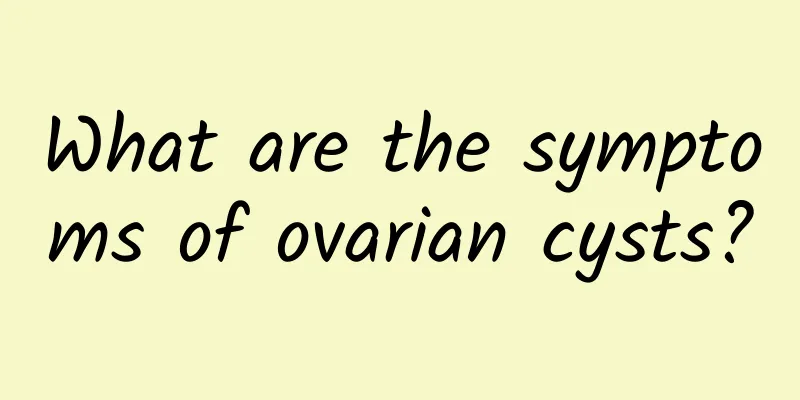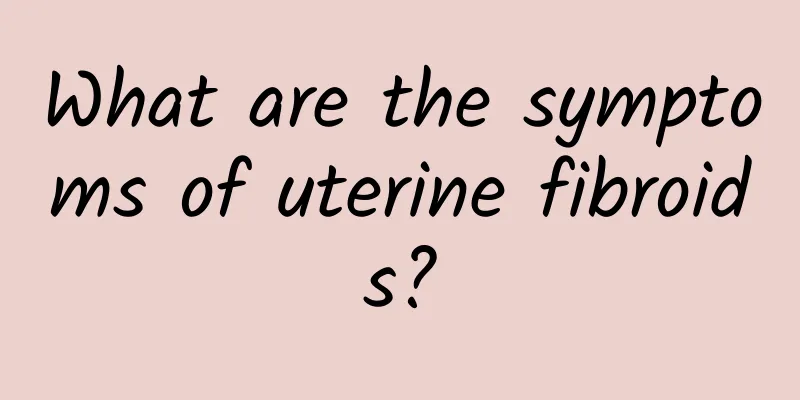What are the symptoms of ovarian cysts?

|
What symptoms will appear after ovarian cyst? Ovarian cyst is a tumor disease, its pathogenesis is relatively hidden, easy to be ignored, and many patients cannot detect it early. Once ovarian cyst is diagnosed, it should be treated actively to avoid causing greater harm. So, how do we know if we have ovarian cysts? In addition to the necessary clinical examinations, self-judgment is also very important. So we need to know more about the symptoms of ovarian cysts. What symptoms will occur after suffering from ovarian cyst? Abdominal pain and lower abdominal discomfort Although ovarian cysts have no complications and are less painful, patients still feel abdominal pain. Patients with malignant tumors will have abdominal pain and leg pain. In particular, sudden abdominal pain is mainly caused by tumor pedicle torsion, or infection and initial bleeding caused by tumor rupture. In addition, because the tumor is affected by gastrointestinal motility and changes in body movement, coupled with its own weight, when it moves in the pelvis, it involves the pelvic infundibulum ligament and tumor pedicle, so patients will feel a distension in the lower abdomen. Thickening of waist and abdomen The patient found that his abdomen had become larger, and in the morning, he occasionally felt abdominal distension and discomfort. Pressure on internal organs If the tumor is too large, it may compress the diaphragm, causing the patient to have difficulty breathing or palpitations. A huge benign ovarian cyst fills the entire abdominal cavity, increasing the intra-abdominal pressure, making the venous return of the lower limbs unsmooth, and causing bilateral lower limb and abdominal wall edema. Malignant ovarian cysts can also compress the iliac veins, causing lower limb edema. Tumors can also compress abdominal organs, causing urination difficulties and constipation. Uterine bleeding Generally speaking, ovarian cysts do not destroy all ovarian tissue, so most of them will not cause menstrual disorders. Some uterine bleeding is caused by endometrial congestion, or because the malignant tumor directly metastasizes to the endometrium, or because the ovarian tumor changes the blood vessel distribution in the pelvis, rather than endocrine bleeding. Through the introduction of this article, I think you have a better understanding of this disease. This is an introduction to the symptoms of ovarian cysts. At the end of the article, I would like to remind everyone that the treatment of ovarian cysts must be carried out in a regular hospital. Do not trust the treatment of special drugs or small clinics and other informal institutions. |
<<: What are the obvious symptoms of early ovarian cysts?
>>: What are the effective methods for treating ovarian cysts?
Recommend
Drinking coffee can increase muscle strength and prevent dementia... A table can help you understand your coffee intake and prevent addiction!
The popularity of coffee culture has also led to ...
What are the main symptoms of cervical hypertrophy?
Cervical hypertrophy is a common gynecological di...
10 tips on how to lose weight healthily
Tip 1: A simple rice cooker soup for a complete m...
Detailed introduction and impact of blocking antibodies
Inhibitory antibodies: Normal pregnant women have...
What are the symptoms of various types of adnexitis?
Adnexitis is something that female friends are no...
Treatment of adnexitis based on syndrome differentiation and treatment in traditional Chinese medicine
Grandma Yang is 65 years old. She has been feelin...
Can uterine fibroids be cured? What are uterine fibroids?
Can uterine fibroids be cured? What are uterine f...
Experts explain how Western medicine treats adnexitis
Western medicine is currently a common method for...
Several common causes of acute cervicitis
Although the incidence of acute cervicitis is not...
How to prevent cervicitis
Cervicitis is an inflammatory disease that occurs...
What are the symptoms of adnexitis?
Most people know that adnexitis has a bad effect ...
Drink green tea before exercise to burn fat. One red and green tablet is enough.
As the weather gradually turns to hot summer, in ...
Will spleen and kidney deficiency cause abnormal leucorrhea?
Spleen deficiency and kidney deficiency may lead ...
What are the causes of irregular menstruation? 6 causes of irregular menstruation
Irregular menstruation is also very common under ...
Afraid of obesity, reject fat and dare not eat oil? Mediterranean diet with olive oil can fight inflammation and prevent cardiovascular disease
For those who are worried about gaining weight, t...









